Arts & Entertainment
Change of heart
Texas PFLAG mom shares journey of accepting her lesbian daughter
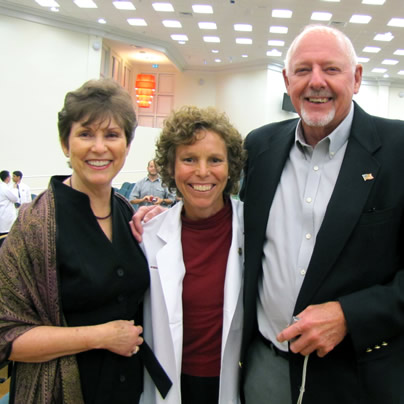
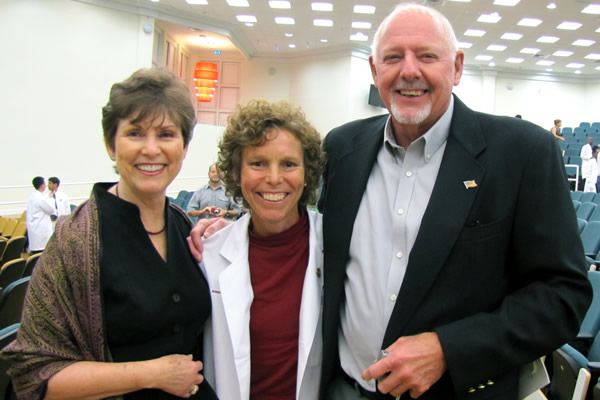
Shari Johnson (left) with her daughter Cholene and husband James in Grenada for Cholene’s white coat ceremony at the start of her medical school program in January 2011. (Photo courtesy Johnson/Changing Lives Press)
Shari Johnson hasn’t thought much about Mother’s Day.
“I really haven’t thought that far ahead,” the long-time Odessa, Texas, mother, grandmother, great-grandmother and conservative Evangelical Christian says by phone from her home. “[My children] pretty much call me if they’re available but I try not to put a whole lot of that unrealized expectation into things. They have their own lives and their own spouses so it’s about them and that’s how it should be and it works for us.”
Johnson might not be thinking much about being a mom this weekend but it’s a topic she’s thought about intently in recent years. Her first book “Above All Things,” published through her daughter Cholene Espinoza’s Changing Lives Press, comes out May 21 and tells of Johnson’s nearly decade-long journey from the time Cholene came out to her by phone as a lesbian in July 2002, to Johnson’s status now as a PFLAG mom (she started a chapter of the gay-affirming group in Odessa) who has retained her faith in the process (order the book here).
The book tells extensively of Johnson’s (a former dental hygienist) rocky early life, her born-again experience in 1971 after two failed marriages, the black-and-white world view that developed out of years of going to Evangelical churches and the painful journey that came from not only accepting her daughter being gay, but the extensive ramifications it had on every aspect of her life.
Though her prayer had initially been that Cholene — an overachiever pilot with years of Air Force and commercial flying under her belt who’s now in medical school — would “be delivered” from homosexuality, Johnson now sees the experience as a catalyst for a radical adjustment to her faith and overall world view. She credits God with her change of heart and writes several times in the book of experiences where she feels the Lord was speaking to her.
“I kept praying that God would change my daughter but I’m the one who ended up being changed,” Johnson writes. “Prior to this time, I thought I had all the answers. Now I’m not even sure that I understand the questions. I viewed life as being either black or white, there was no gray. I avoided anyone who didn’t think as I did. I was a ‘my-mind-is-made-up-don’t-confuse-me-with-the-facts’-type of person.”
But Johnson’s views began to evolve as she realized her daughter’s 2004 marriage to White House correspondent Ellen Ratner was bringing an unfairly different reaction than it would have had she been marrying a man, the hypocrisy she says Christians often exhibit when talking of the supposed sin of homosexuality compared to most other sins (of which Johnson says they often given themselves a “free pass”), and the realization that nobody (especially a Christian) would choose a gay orientation for themselves. These epiphanies had life-changing effects on her.
After years of study and thought, Johnson believes centuries of anti-gay preaching in Christian churches of most varieties comes down to mistakes in scriptural interpretation.
“If we believe that homosexuality is not a choice, then we have to either believe that God is cruel to have played this terrible trick on people and not the loving God we think he is (and that would be a God I could not serve),” she writes in the book. “Or there has to be a mistake in interpreting the scriptures. I chose to believe the latter.”
Though initially highly skeptical, Johnson feels the Lord brought her to a place where she was able to consider that she may have been wrong before.
“I always thought I had sought the will of God in my life before but I realize now what I had often been doing was going to him with my plan and then leaving before I got an answer,” she says. “If people are truly seeking, and all I’m asking people to do is consider that we could be wrong on the way some of these scriptures have been interpreted over the years, but when I finally got around to reading what some of these writers were saying — and I avoided even reading this stuff for the longest time — I realized I needed to start thinking for myself and not just keep blindly repeating what someone else had told me.”
Johnson credits the writings of Rev. Paula Jackson and her work “What Does the Bible Say About Being Gay? — Probably Not What You’ve Been Told,” with helping her expand her theological horizons. That Jackson didn’t write in a “histrionic, blasphemous, in-your-face” manner that “didn’t disregard my point of view,” resonated with Johnson.
“She just presented the facts and lets the reader come to his or her own conclusions,” Johnson writes. “The entire study boils down to this one question: What if we’re wrong?”
Espinoza, who eventually hopes to work as a doctor with Ratner in South Sudan, says it’s important for gay Christians to follow the example of Christ rather than get sidelined in what she and her mother now feel is misconstrued anti-gay theology.
“Christ did not have anything to say about homosexuality but he had a lot to say about love, honor and respect,” she wrote in an e-mail to the Blade. “If we are loving, honorable and respectful in our relationships, I think that reduces a lot of the guilt and self loathing in our heads. We need to separate those who condemn us from the message of love and reconciliation, the message that Christ has brought to us.”
Johnson has become a staunch advocate for LGBT acceptance within Christian churches in the Odessa area. It’s led to a thorny conundrum — she’s tried sharing her story, but often leaves Bible studies and church services feeling she’s been merely placated. She’s at a point now where she can’t stomach anti-gay teaching from the pulpit and has left several churches in frustration. She says gay-welcoming churches in her part of the state are pretty much non-existent.
Johnson has lots of interesting opinions on trends in the modern church, especially with the anti-gay teaching that abounds in the Bible Belt.
She concedes there is a time, whether it’s in the political or religious realm, where it’s OK to respectfully agree to disagree.
“This whole idea of, ‘You have to see things my way,’ that’s never worked in politics, religion or anything else,” she says. “It never worked and it never will. But God gave me a big wake-up call and I would love for other people to not have to go through what I went through. That’s really why I wrote the book.”
She says it’s possible that churches with anti-gay teaching that seem to be thriving — even those led by household-name preachers like Rick Warren and Joel Osteen — might not be as blest as it appears.
“You can’t always assume that God’s blessing a church just because of the numbers,” she says. “People go to church for all sorts of reasons. And when these men have been put on the spot on national television and asked about gay issues and the whole Christian community is sort of collectively holding its breath waiting to hear what they say, they give the accepted answer, but I doubt very seriously that’s what they’re preaching from the pulpit or what they really feel in their hearts.”
But could so many religious teachers have been so wrong for so many years on gay issues? Johnson says yes.
“It’s happened since creation,” she says. “Anytime man gets involved, he manages to screw things up … Anytime there’s been a religious movement that gets started, it’s basically that person’s idea of who God is and what sin is. We tend to think we have all this figured out but you know what the Bible says about our own righteousness — it’s like filthy rags to God.”
But how does someone — especially a gay teen struggling with suicidal thoughts growing up in an Evangelical household — know whom to listen to? Aren’t there well-meaning Christians who simply believe homosexuality isn’t part of God’s plan?
Johnson says that’s where her biggest concern lies — she wants LGBT teens and young adults to have a chance to consider the possibility that their being gay isn’t the sinful curse many churches make it out to be. It’s the main reason she started her PFLAG chapter.
“I don’t have an easy answer for this but we have to have a place for kids to go and hear a different message. They’re not exposed to it at home, they have no place to hear a positive message, they’re in trouble and it has nothing to do with who they really are.”
With so many voices out there claiming to be spokesmen for God or claiming to have heard from God directly, Johnson admits absolute truth is “not always easy to discern.” She says she knows it’s God speaking when she feels compelled to go out of her comfort zone for the greater good.
“I usually know that if it’s contrary to the way I think, it’s usually God,” she says with a self-deprecating tone she uses often in the book. “I tend to line up with the other guy more often in my own thinking. But I can tell if I’m doing something for selfish reasons or whatever, it’s not of God. He does not let up. If it’s something I feel I’m supposed to do … I’m usually thinking, ‘Don’t make me do this.’ You have to learn to set aside the voice of past teaching, past thinking. … For everyone it’s different, but I feel when it’s truly God speaking, it’s a different thing and you know it.”
Movies
Radical reframing highlights the ‘Wuthering’ highs and lows of a classic
Emerald Fennell’s cinematic vision elicits strong reactions

If you’re a fan of “Wuthering Heights” — Emily Brontë’s oft-filmed 1847 novel about a doomed romance on the Yorkshire moors — it’s a given you’re going to have opinions about any new adaptation that comes along, but in the case of filmmaker Emerald Fennell’s new cinematic vision of this venerable classic, they’re probably going to be strong ones.
It’s nothing new, really. Brontë’s book has elicited controversy since its first publication, when it sparked outrage among Victorian readers over its tragic tale of thwarted lovers locked into an obsessive quest for revenge against each other, and continuing to shock generations of readers with its depictions of emotional cruelty and violent abuse, its dysfunctional relationships, and its grim portrait of a deeply-embedded class structure which perpetuates misery at every level of the social hierarchy.
It’s no wonder, then, that Fennell’s adaptation — a true “fangirl” appreciation project distinguished by the radical sensibilities which the third-time director brings to the mix — has become a flash point for social commentators whose main exposure to the tale has been flavored by decades of watered-down, romanticized “reinventions,” almost all of which omit large portions of the novel to selectively shape what’s left into a period tearjerker about star-crossed love, often distancing themselves from the raw emotional core of the story by adhering to generic tropes of “gothic romance” and rarely doing justice to the complexity of its characters — or, for that matter, its author’s more complex intentions.
Fennell’s version doesn’t exactly break that pattern; she, too, elides much of the novel’s sprawling plot to focus on the twisted entanglement between Catherine Earnshaw (Margot Robbie), daughter of the now-impoverished master of the titular estate (Martin Clunes), and Heathcliff (Jacob Elordi), a lowborn child of unknown background origin that has been “adopted” by her father as a servant in the household. Both subjected to the whims of the elder Earnshaw’s violent temper, they form a bond of mutual support in childhood which evolves, as they come of age, into something more; yet regardless of her feelings for him, Cathy — whose future status and security are at risk — chooses to marry Edgar Linton (Shazad Latif), the financially secure new owner of a neighboring estate. Heathcliff, devastated by her betrayal, leaves for parts unknown, only to return a few years later, with a mysteriously-obtained fortune. Imposing himself into Cathy’s comfortable-but-joyless matrimony, he rekindles their now-forbidden passion and they become entwined in a torrid affair — even as he openly courts Linton’s naive ward Isabella (Alison Oliver) and plots to destroy the entire household from within. One might almost say that these two are the poster couple for the relationship status “it’s complicated.” and it’s probably needless to say things don’t go well for anybody involved.
While there is more than enough material in “Wuthering Heights” that might easily be labeled as “problematic” in our contemporary judgments — like the fact that it’s a love story between two childhood friends, essentially raised as siblings, which becomes codependent and poisons every other relationship in their lives — the controversy over Fennell’s version has coalesced less around the content than her casting choices. When the project was announced, she drew criticism over the decision to cast Robbie (who also produced the film) opposite the younger Elordi. In the end, the casting works — though the age gap might be mildly distracting for some, both actors deliver superb performances, and the chemistry they exude soon renders it irrelevant.
Another controversy, however, is less easily dispelled. Though we never learn his true ethnic background, Brontë’s original text describes Heathcliff as having the appearance of “a dark-skinned gipsy” with “black fire” in his eyes; the character has typically been played by distinctly “Anglo” men, and consequently, many modern observers have expressed disappointment (and in some cases, full-blown outrage) over Fennel’s choice to use Elordi instead of putting an actor of color for the part, especially given the contemporary filter which she clearly chose for her interpretation for the novel.
In fact, it’s that modernized perspective — a view of history informed by social criticism, economic politics, feminist insight, and a sexual candor that would have shocked the prim Victorian readers of Brontë’s novel — that turns Fennell’s visually striking adaptation into more than just a comfortably romanticized period costume drama. From her very opening scene — a public hanging in the village where the death throes of the dangling body elicit lurid glee from the eagerly-gathered crowd — she makes it oppressively clear that the 18th-century was not a pleasant time to live; the brutality of the era is a primal force in her vision of the story, from the harrowing abuse that forges its lovers’ codependent bond, to the rigidly maintained class structure that compels even those in the higher echelons — especially women — into a kind of slavery to the system, to the inequities that fuel disloyalty among the vulnerable simply to preserve their own tenuous place in the hierarchy. It’s a battle for survival, if not of the fittest then of the most ruthless.
At the same time, she applies a distinctly 21st-century attitude of “sex-positivity” to evoke the appeal of carnality, not just for its own sake but as a taste of freedom; she even uses it to reframe Heathcliff’s cruel torment of Isabella by implying a consensual dom/sub relationship between them, offering a fragment of agency to a character typically relegated to the role of victim. Most crucially, of course, it permits Fennell to openly depict the sexuality of Cathy and Heathcliff as an experience of transgressive joy — albeit a tormented one — made perhaps even more irresistible (for them and for us) by the sense of rebellion that comes along with it.
Finally, while this “Wuthering Heights” may not have been the one to finally allow Heathcliff’s racial identity to come to the forefront, Fennell does employ some “color-blind” casting — Latif is mixed-race (white and Pakistani) and Hong Chau, understated but profound in the crucial role of Nelly, Cathy’s longtime “paid companion,” is of Vietnamese descent — to illuminate the added pressures of being an “other” in a world weighted in favor of sameness.
Does all this contemporary hindsight into the fabric of Brontë’s epic novel make for a quintessential “Wuthering Heights?” Even allowing that such a thing were possible, probably not. While it presents a stylishly crafted and thrillingly cinematic take on this complex classic, richly enhanced by a superb and adventurous cast, it’s not likely to satisfy anyone looking for a faithful rendition, nor does it reveal a new angle from which the “romance” at its center looks anything other than toxic — indeed, it almost fetishizes the dysfunction. Even without the complex debate around Heathcliff’s racial identity, there’s plenty here to prompt purists and revisionists alike to find fault with Fennell’s approach.
Yet for those looking for a new window into to this perennial classic, and who are comfortable with the radical flourish for which Fennell is already known, it’s an engrossing and intellectually stimulating exploration of this iconic story in a new way — and for cinema fans, that’s more than enough reason to give “Wuthering Heights” a chance.
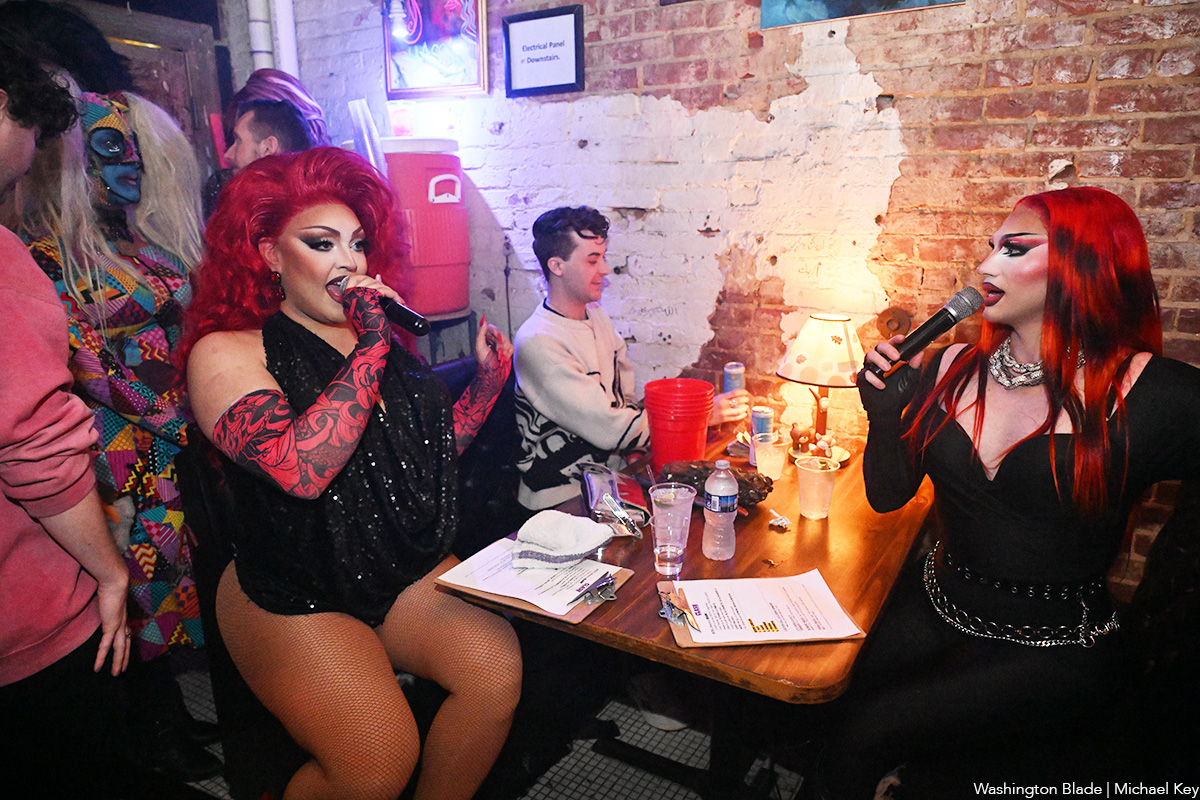
Crimsyn and Tatianna hosted the new weekly drag show Clash at Trade (1410 14th Street, N.W.) on Feb. 14, 2026. Performers included Aave, Crimsyn, Desiree Dik, and Tatianna.
(Washington Blade photos by Michael Key)
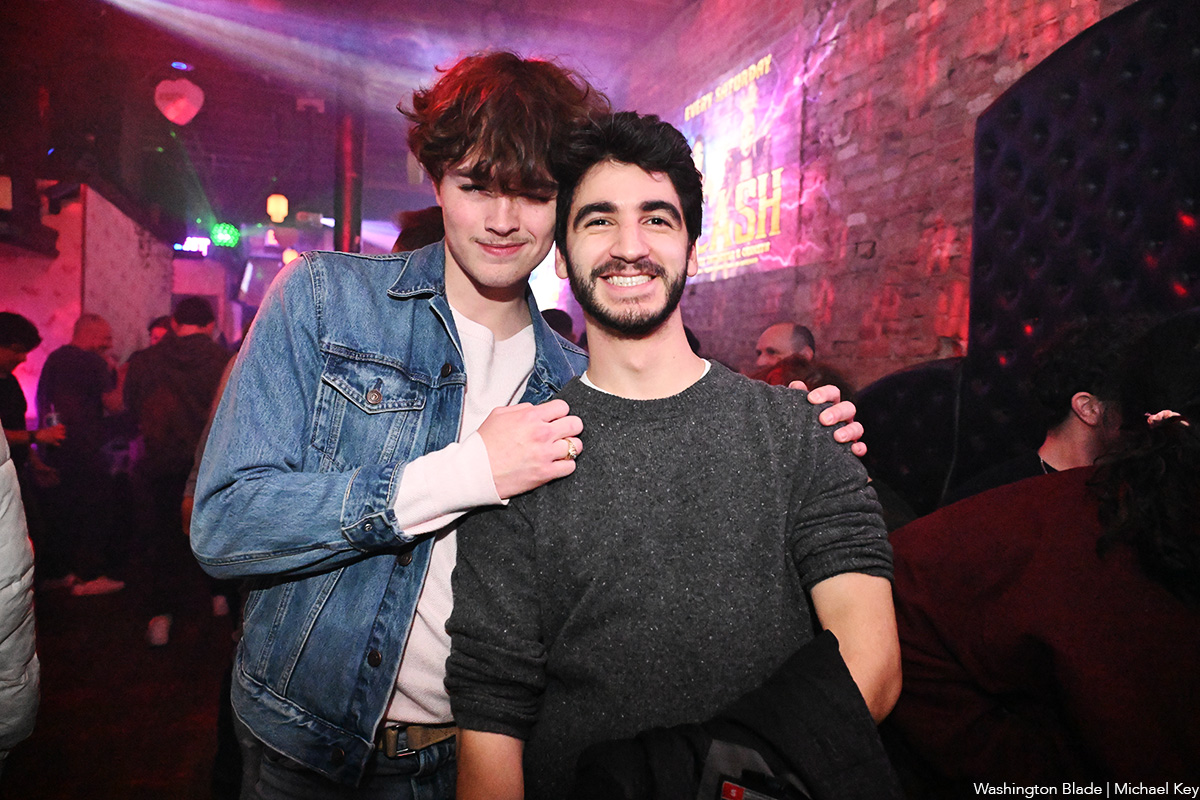
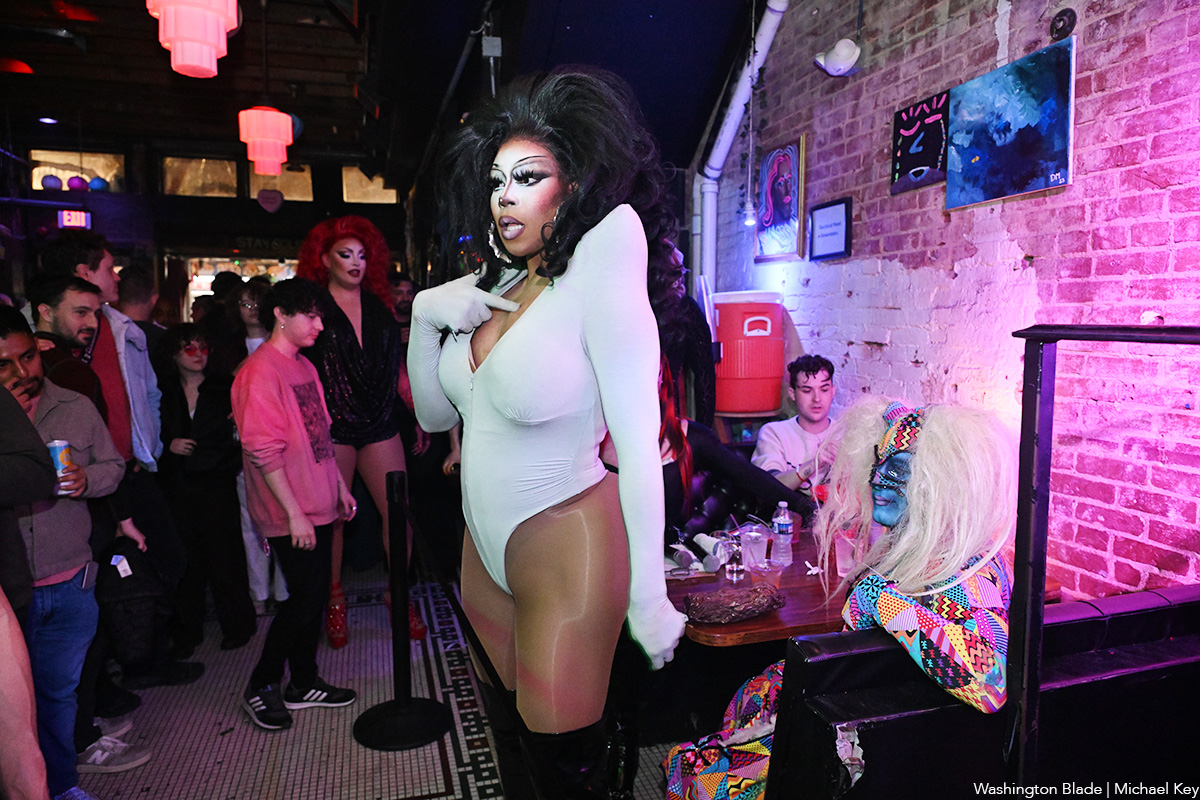
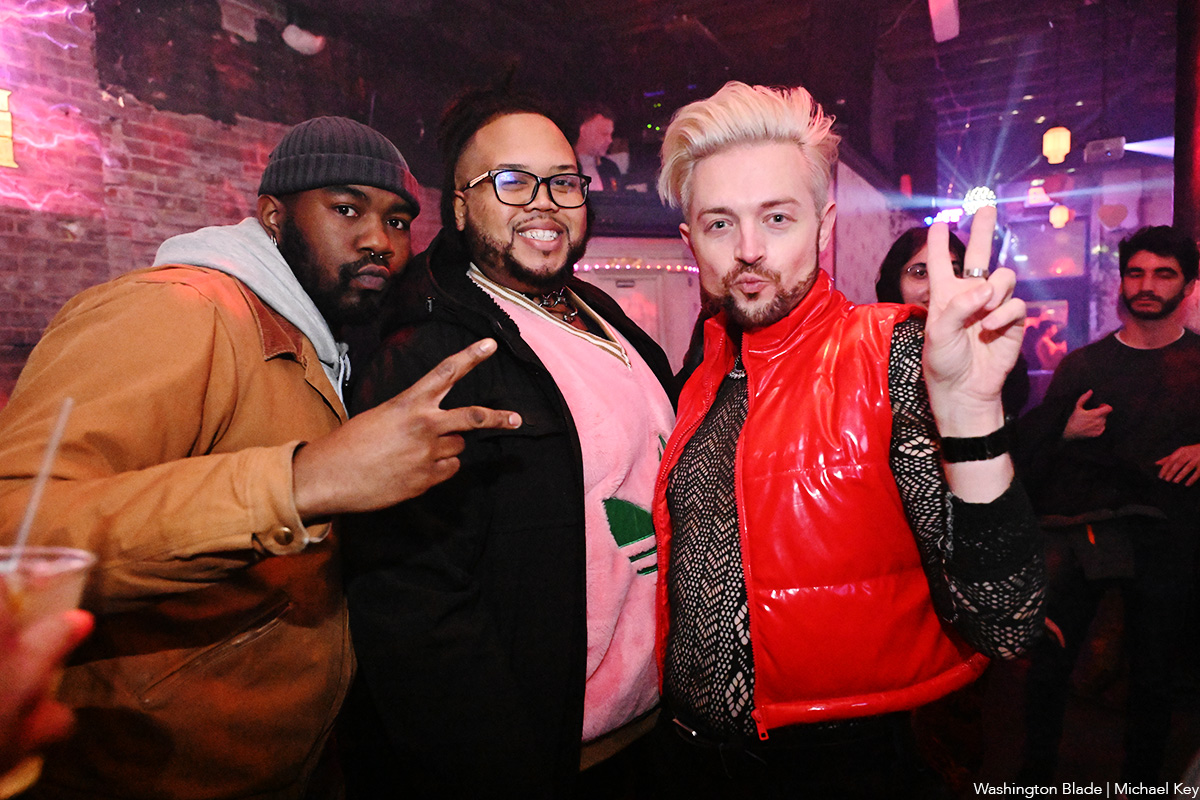
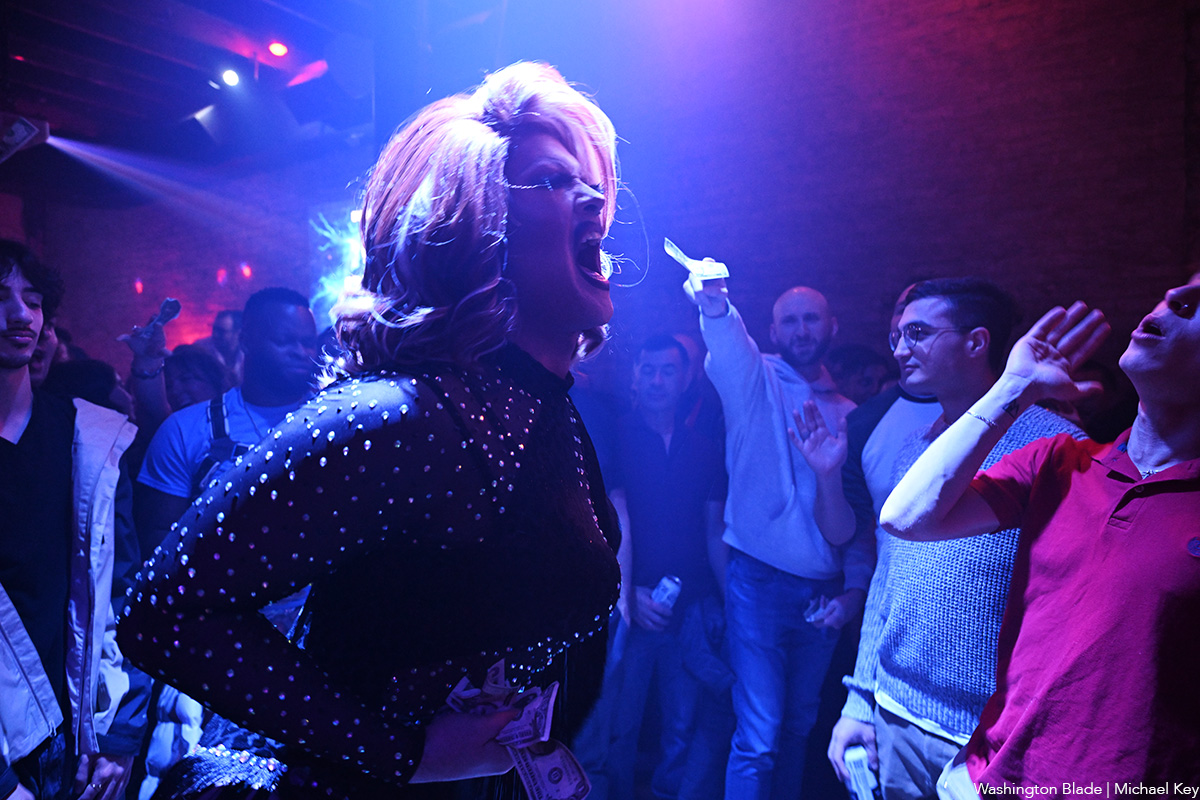
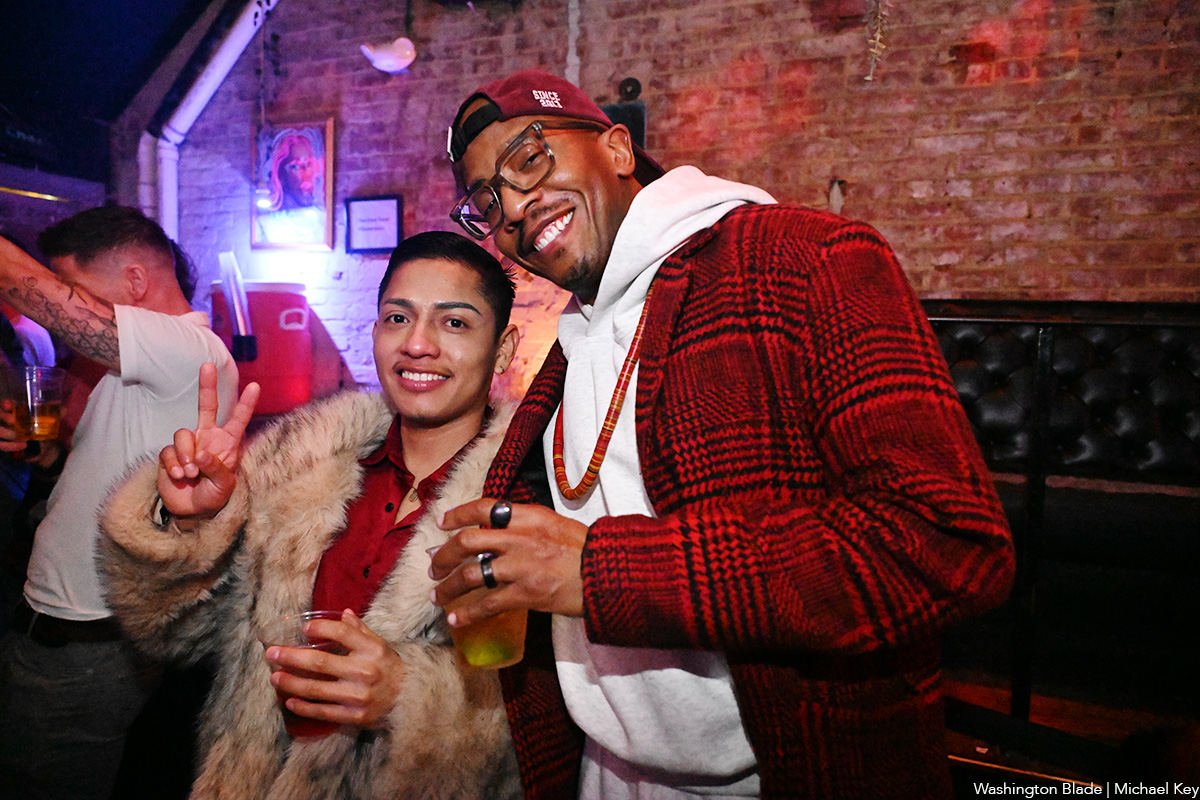
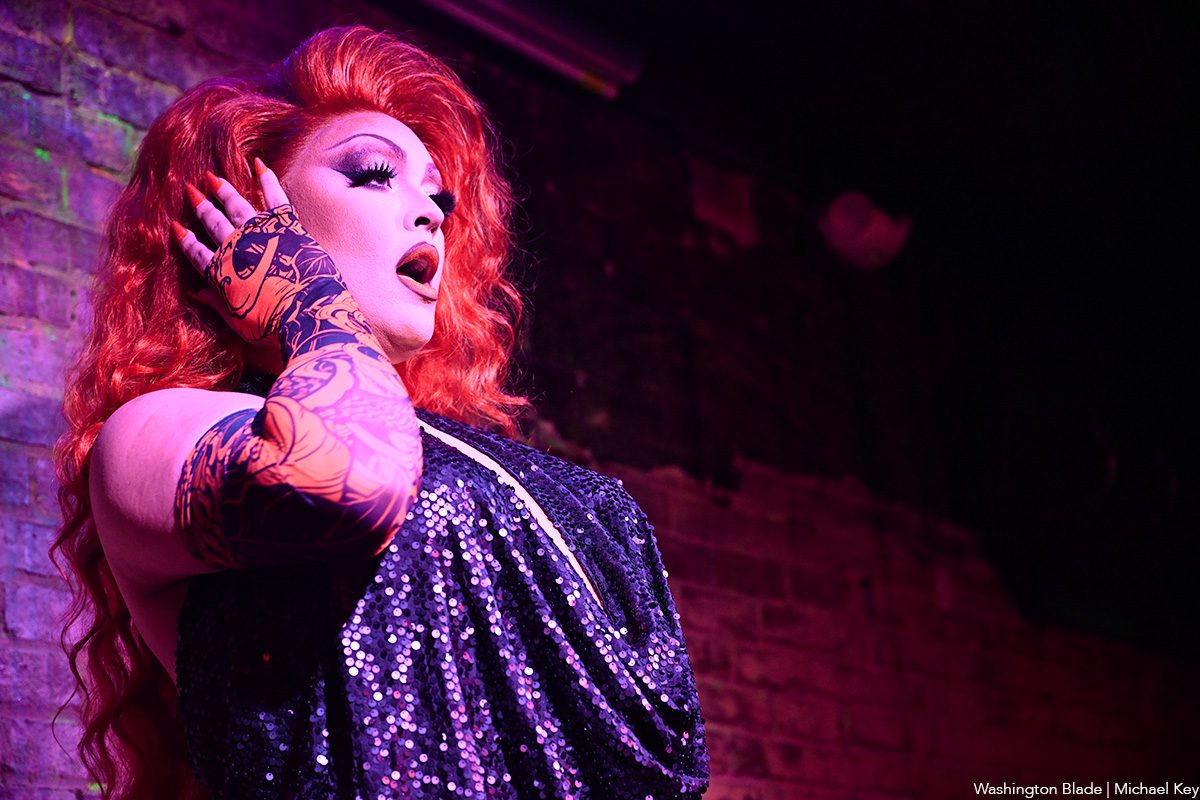
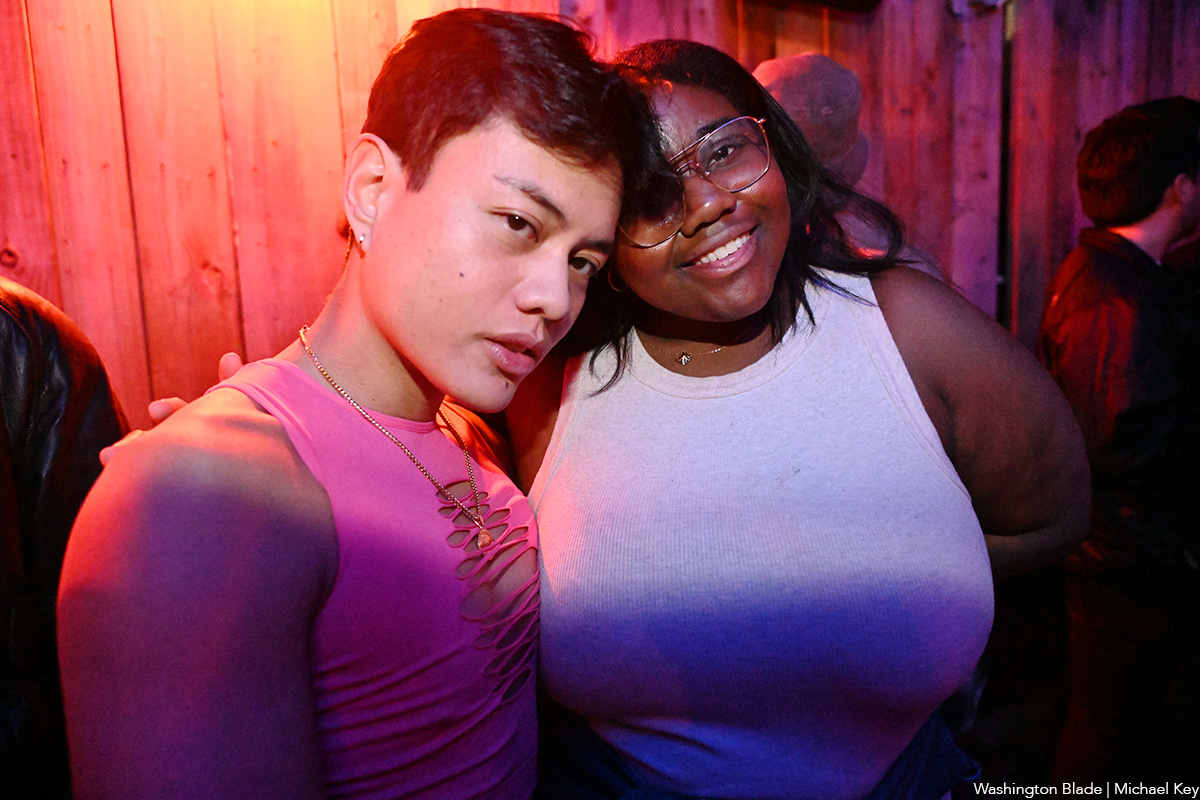
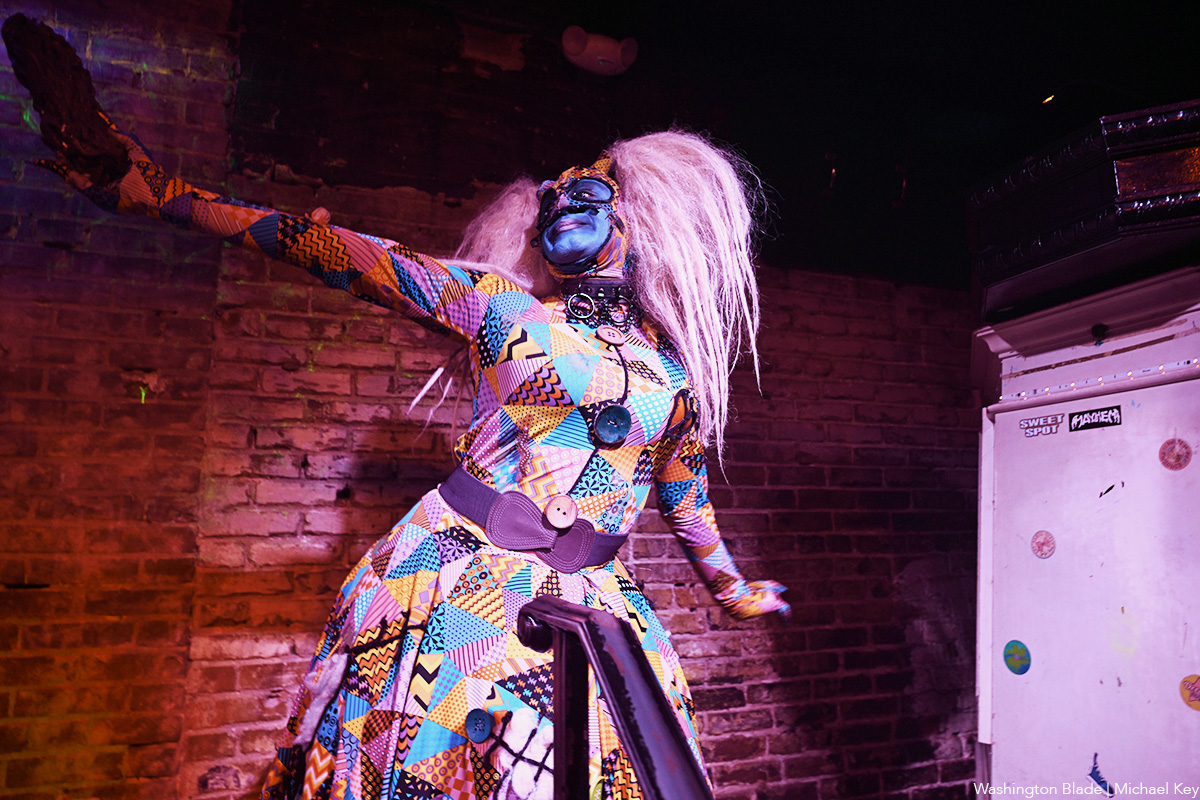
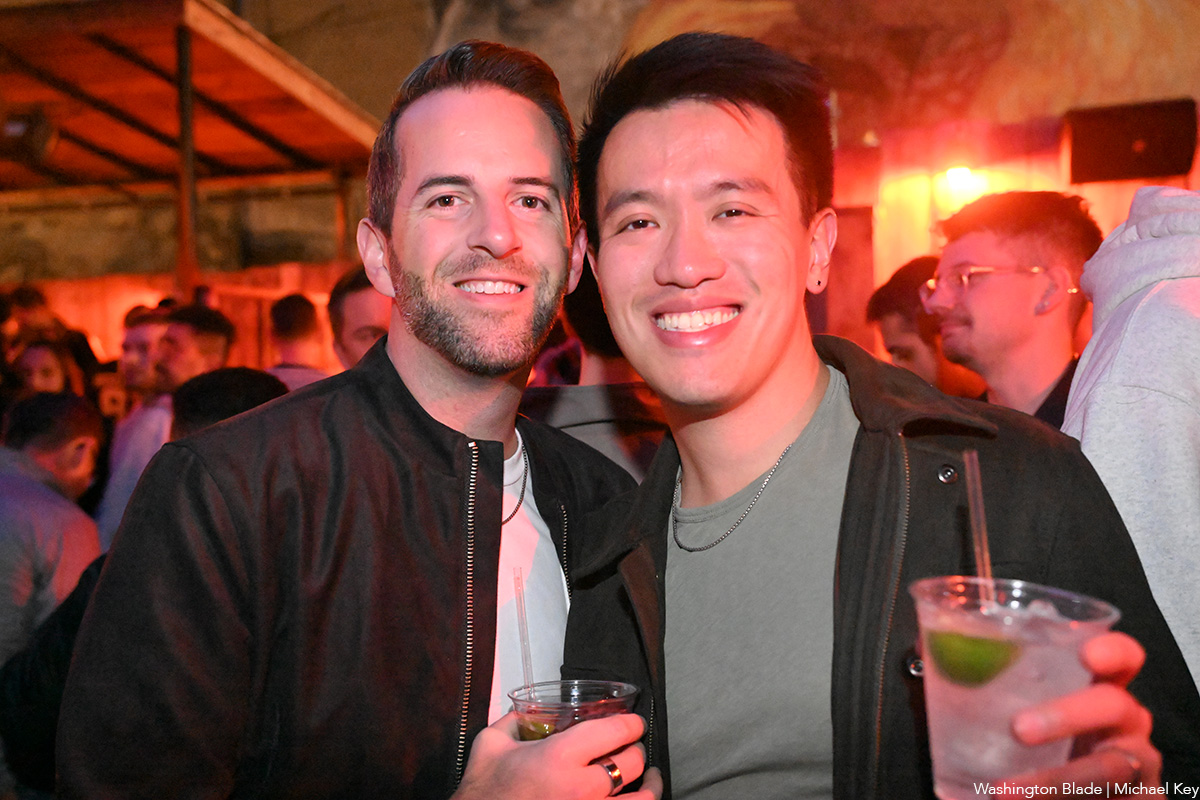
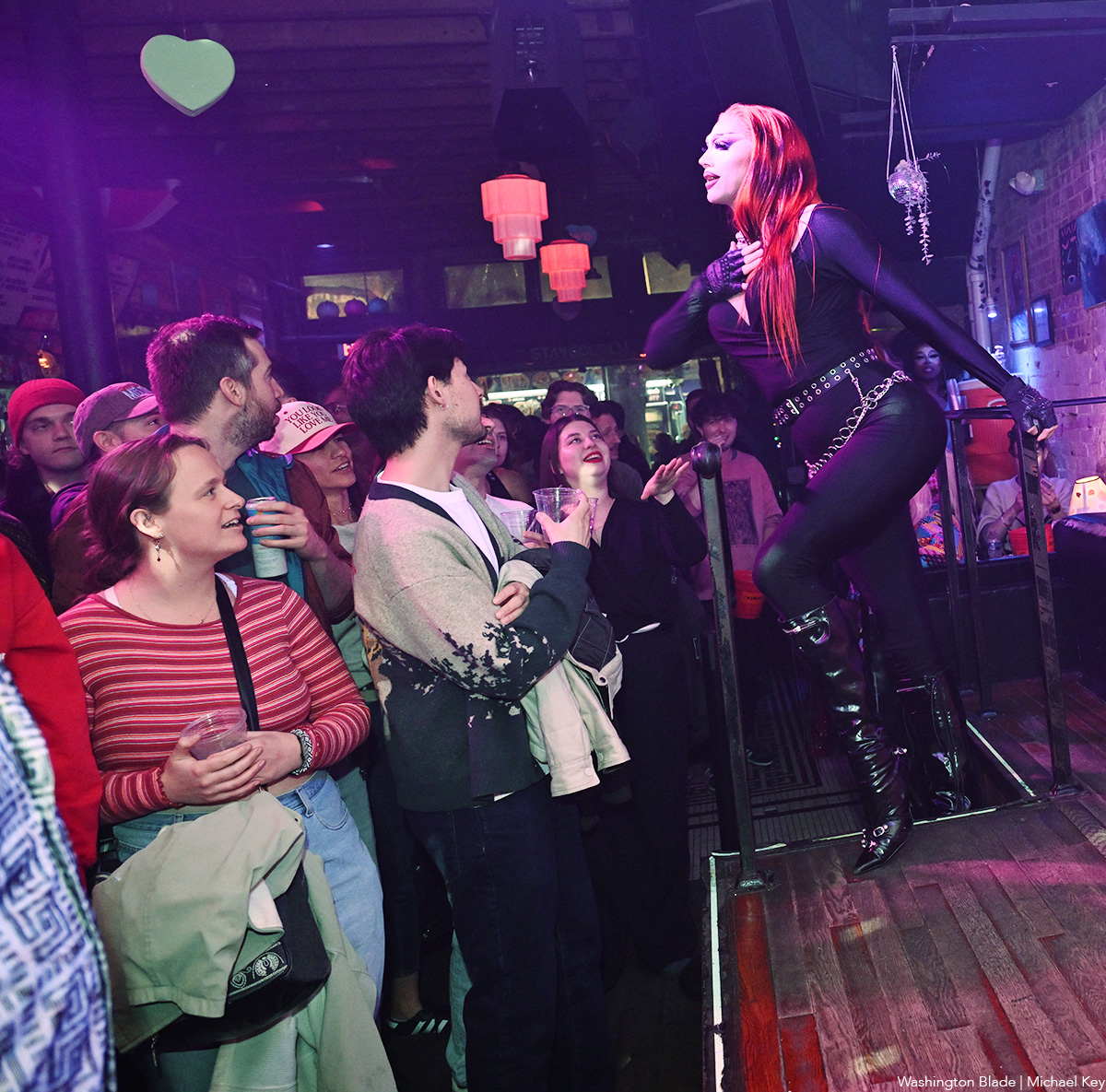
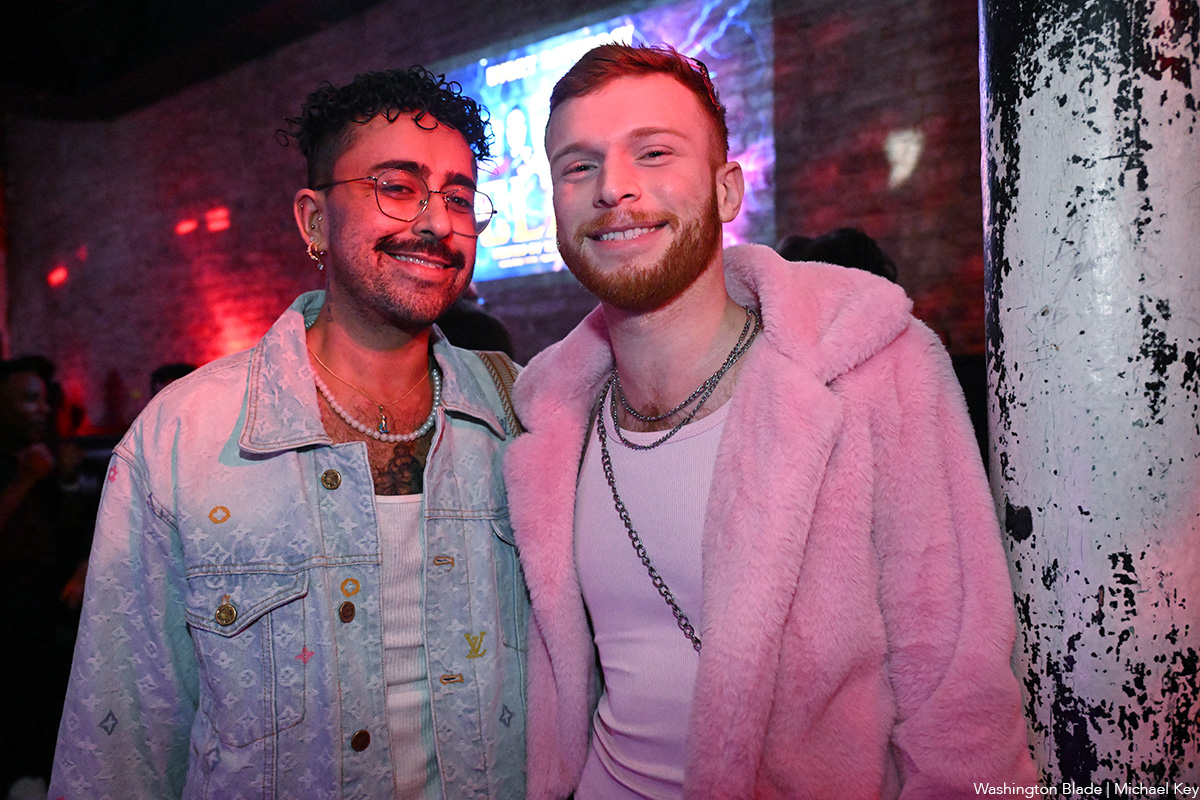
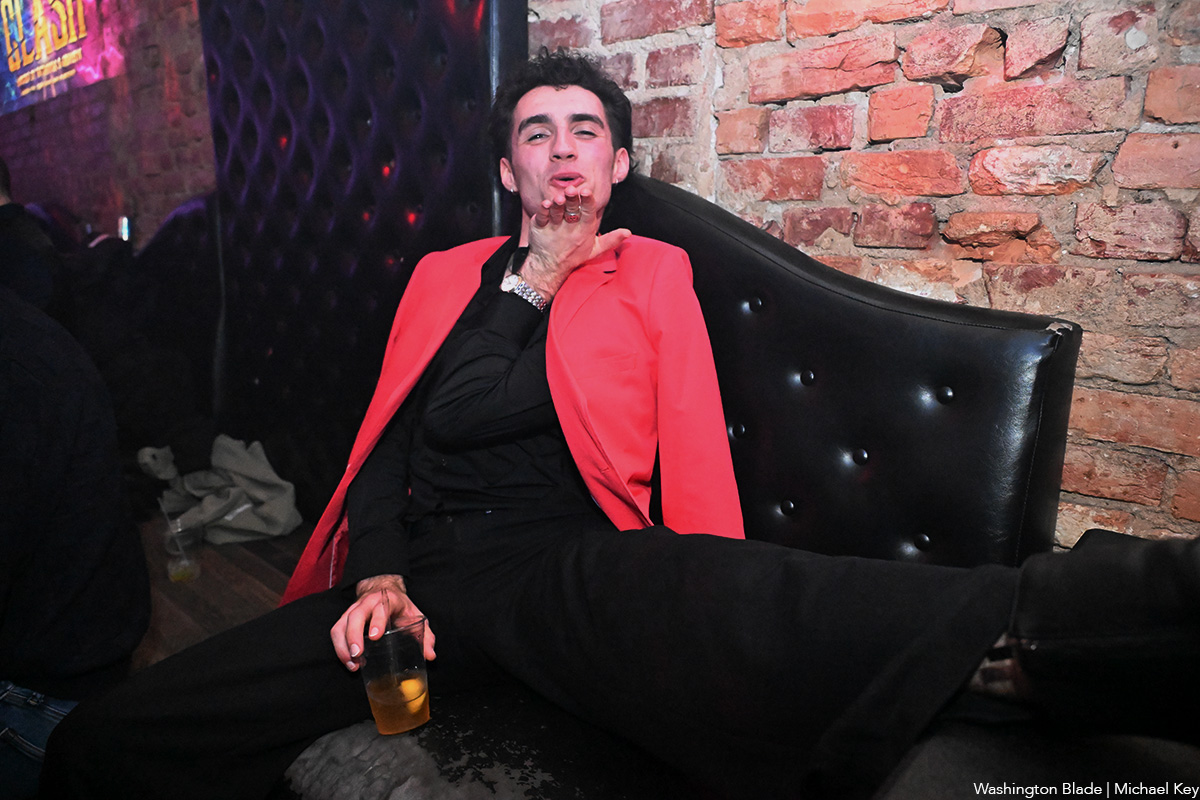
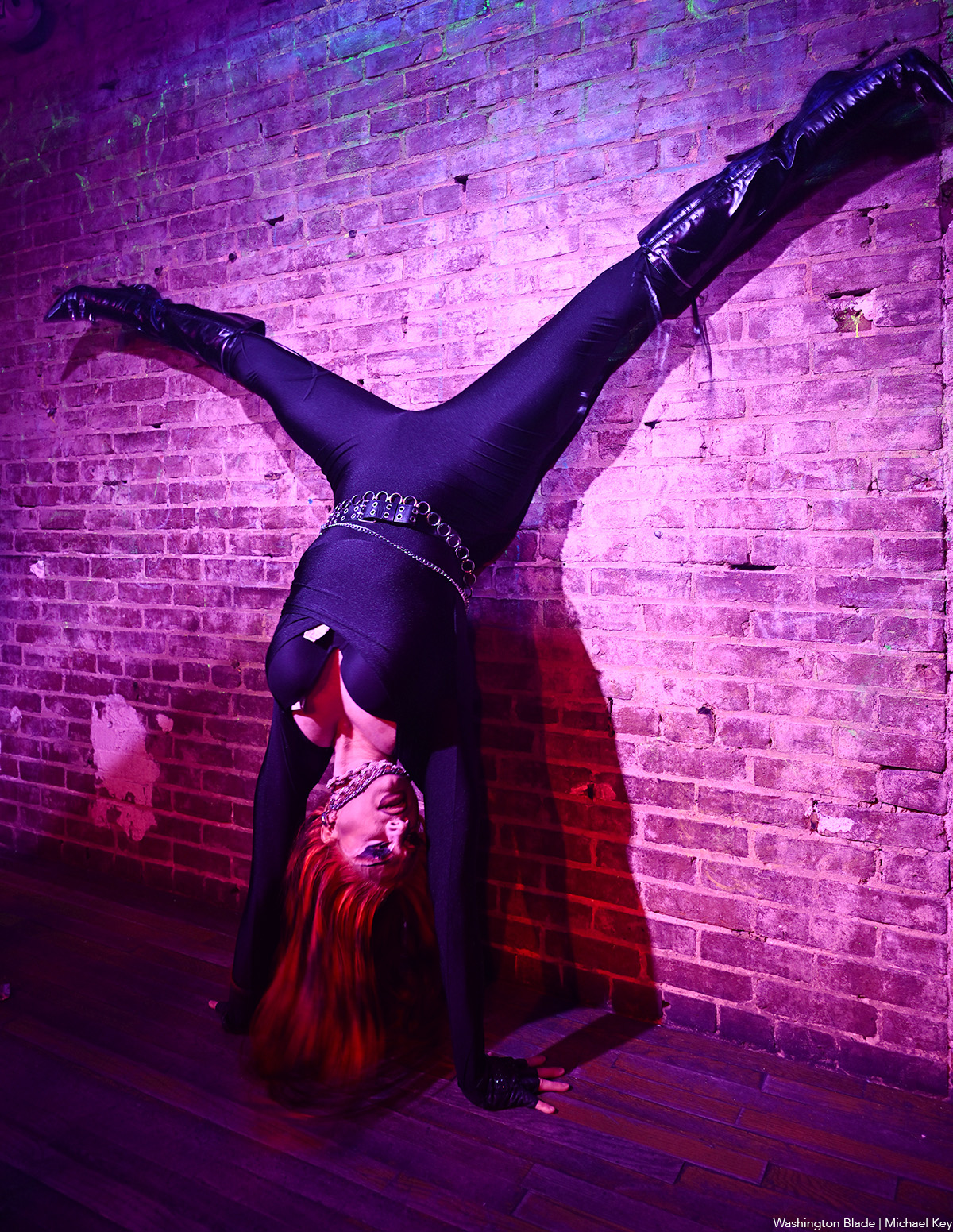
Theater
Magic is happening for Round House’s out stage manager
Carrie Edick talks long hours, intricacies of ‘Nothing Up My Sleeve’

‘Nothing Up My Sleeve’
Through March 15
Round House Theatre
4545 East-West Highway
Bethesda, Md. 20814
Tickets start at $50
Roundhousetheatre.org
Magic is happening for out stage manager Carrie Edick.
Working on Round House Theatre’s production of “Nothing Up My Sleeve,” Edick quickly learned the ways of magicians, their tricks, and all about the code of honor among those who are privy to their secrets.
The trick-filled, one-man show starring master illusionist Dendy and staged by celebrated director Aaron Posner, is part exciting magic act and part deeply personal journey. The new work promises “captivating storytelling, audience interaction, jaw-dropping tricks, and mind-bending surprises.”
Early in rehearsals, there was talk of signing a non-disclosure agreement (NDA) for production assistants. It didn’t happen, and it wasn’t necessary, explains Edick, 26. “By not having an NDA, Dendy shows a lot of trust in us, and that makes me want to keep the secrets even more.
“Magic is Dendy’s livelihood. He’s sharing a lot and trusting a lot; in return we do the best we can to support him and a large part of that includes keeping his secrets.”
As a production assistant (think assistant stage manager), Edick strives to make things move as smoothly as possible. While she acknowledges perfection is impossible and theater is about storytelling, her pursuit of exactness involves countless checklists and triple checks, again and again. Six day weeks and long hours are common. Stage managers are the first to arrive and last to leave.
This season has been a lot about learning, adds Edick. With “The Inheritance” at Round House (a 22-week long contract), she learned how to do a show in rep which meant changing from Part One to Part Two very quickly; “In Clay” at Signature Theatre introduced her to pottery; and now with “Nothing Up My Sleeve,” she’s undergoing a crash course in magic.
She compares her career to a never-ending education: “Stage managers possess a broad skillset and that makes us that much more malleable and ready to attack the next project. With some productions it hurts my heart a little bit to let it go, but usually I’m ready for something new.”
For Edick, theater is community. (Growing up in Maryland, she was a shy kid whose parents signed her up for theater classes.) Now that community is the DMV theater scene and she considers Round House her artistic home. It’s where she works in different capacities, and it’s the venue in which she and actor/playwright Olivia Luzquinos chose to be married in 2024.
Edick came out in middle school around the time of her bat mitzvah. It’s also around the same time she began stage managing. Throughout high school she was the resident stage manager for student productions, and also successfully participated in county and statewide stage management competitions which led to a scholarship at the University of Maryland, Baltimore County (UMBC) where she focused on technical theater studies.
Edick has always been clear about what she wants. At an early age she mapped out a theater trajectory. Her first professional gig was “Tuesdays with Morrie” at Theatre J in 2021. She’s worked consistently ever since.
Stage managing pays the bills but her resume also includes directing and intimacy choreography (a creative and technical process for creating physical and emotional intimacy on stage). She names Pulitzer Prize winning lesbian playwright Paula Vogel among her favorite artists, and places intimacy choreographing Vogel’s “How I learned to Drive” high on the artistic bucket list.
“To me that play is heightened art that has to do with a lot of triggering content that can be made very beautiful while being built to make you feel uncomfortable; it’s what I love about theater.”
For now, “Nothing Up My Sleeve” keeps Edick more than busy: “For one magic trick, we have to set up 100 needles.”
Ultimately, she says “For stage managers, the show should stay the same each night. What changes are audiences and the energy they bring.”
-

 Theater5 days ago
Theater5 days agoMagic is happening for Round House’s out stage manager
-

 Baltimore3 days ago
Baltimore3 days ago‘Heated Rivalry’ fandom exposes LGBTQ divide in Baltimore
-

 Real Estate3 days ago
Real Estate3 days agoHome is where the heart is
-

 District of Columbia3 days ago
District of Columbia3 days agoDeon Jones speaks about D.C. Department of Corrections bias lawsuit settlement




















